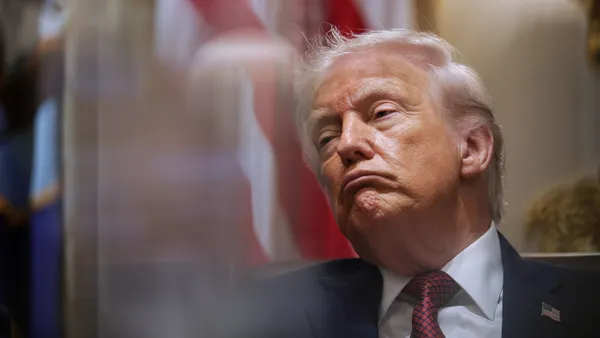Dive Brief:
-
The U.S. Department of Agriculture announced Tuesday it would make $12 billion in short-term emergency funds available to help farmers hit by retaliatory tariffs from China and other countries. According to The Washington Post, the plan would begin in September and is designed to assist soybean farmers, dairy farmers and pork producers, among others.
-
"This is a short-term solution to allow President Trump time to work on long-term trade deals to benefit agriculture and the entire U.S. economy," Agriculture Secretary Sonny Perdue said in a release. "The President promised to have the back of every American farmer and rancher, and he knows the importance of keeping our rural economy strong."
-
The Post reported some U.S. soybean farmers projected they could lose $150,000 or more because of China's 25% tariffs on that crop — a rate that will also be imposed on products including wheat, corn, beef, pork, poultry and seafood. The newspaper also noted the funds would be provided just as farm states most strongly affected by the tariffs get ready to vote in the Nov. 6 midterm elections.
Dive Insight:
The USDA announced three initiatives to help farmers hurt by the tariffs: One is a market facilitation program to give incremental payments to producers of soybeans, sorghum, corn, wheat, cotton, dairy and hogs. The agency will also start a food purchase and distribution program to buy surplus food — fruits, nuts, rice, legumes, beef, pork and milk — for distribution to food banks and other nutrition programs. And the USDA's Foreign Agricultural Service, working with the private sector, will oversee a trade promotion program to develop new export markets for U.S. farm products.
Response to the announcement was mixed. Some agriculture groups said they would prefer the tariffs be removed and more markets become available for their crops.
Mark Recker, president of the Iowa Corn Growers Association, noted that his members had worked for decades to support fair and open trade practices.
"As farmers, we want access to markets, which will allow us the ability to compete on a level playing field, but support these payments if this stands as our only recourse. We will continue to monitor the details of this proposal as it comes together," Recker said in a statement. "Ultimately, resolving trade differences and repairing relationships with our trading partners must be our top priority because much of the demand for our corn lies outside our state and our country’s borders, so fair and open trade remains the key."
Jim Heimerl, president of the National Pork Producers Council, said he was glad the administration took steps to give farmers some relief.
"U.S. pork, which began the year in expansion mode to capitalize on unprecedented global demand, now faces punitive tariffs on 40 percent of its exports," Heimerl said in a statement. "The restrictions we face in critical markets such as Mexico and China — our top two export markets by volume last year — have placed American pig farmers and their families in dire financial straits. We thank the president for taking immediate action."
U.S. Sen. Ben Sasse, R-Neb., a strong opponent of tariffs, told PBS NewsHour the money wasn't going to be enough. Bean losses alone in his state were nearly $12 billion so far this year.
"When you have tariffs, they’re a bad thing," Sasse said. "And then you try to solve them with bailouts, another bad thing, you’re not heading in a good direction. You’re trying to make America 1929 again. And that’s not what the people in the state I represent want. We want to feed the world. We want more markets. We want more trade."
Unless a ceasefire in the trade wars can be worked out in the very near future, it's unlikely money is going to solve the problems U.S. farmers are facing. And while some producers will be able to find alternative markets — perhaps in Asia or Latin America — affected commodities will be stacking up in cold-storage facilities, grain warehouses and other places as farmers try and recoup at least some of their investment.
It's hard to imagine U.S. consumers being able to pick up the slack by buying enough soybeans, sorghum, corn, wheat, cotton, dairy and hogs to cover the shortfall, even if prices should drop. Stockpiles of frozen beef, pork, chicken and turkey products are already at near-record levels across the country, and the tariff situation might get a lot worse before it gets better. And if farmers are compensated to some degree and then decide to limit production as export markets shrink, the country could find itself in a shortage situation with some crops, which would only drive up prices down the road.














